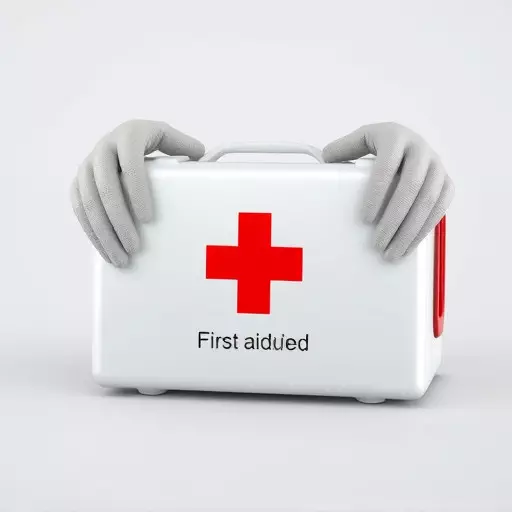TL;DR:
Basic Life Support (BLS) training, encompassing CPR, is a lifesaving skill crucial for personal and community safety. It empowers individuals to respond effectively in emergencies like cardiac arrest or choking, significantly improving survival rates. BLS training meets certification requirements across various professions and enhances employability. Regular recertification ensures skills remain current, fostering preparedness and enabling individuals to make a tangible difference during crises. Everyone should consider obtaining this vital training for personal growth and community resilience.
“Discover the life-saving power of CPR training. This comprehensive guide explores the fundamental role of Basic Life Support (BLS) in empowering individuals to become heroes. Learn why everyone should consider obtaining First Aid and CPR certification, as it unlocks the potential to make a significant difference in your community. From enhancing employment opportunities with first aid training requirements to ensuring safety in diverse environments, regular CPR recertification keeps you prepared to respond effectively.”
- Understanding Basic Life Support: The Foundation of CPR Training
- Lifesaving Skills: Why Everyone Should Consider First Aid and CPR Certification
- Unlocking the Potential to Make a Difference: Benefits for Individuals and Communities
- Enhancing Employment Opportunities: A Competitive Advantage with First Aid Training
- Ensuring Safety in Various Environments: From Workplaces to Public Spaces
- Staying Prepared: The Impact of Regular CPR Recertification
Understanding Basic Life Support: The Foundation of CPR Training
Understanding Basic Life Support forms the very foundation of CPR (Cardiopulmonary Resuscitation) training. It’s more than just a set of techniques; it’s a vital skill that equips individuals to respond effectively in critical situations where someone’s life is at risk. Basic Life Support (BLS) involves recognizing and addressing life-threatening emergencies, like cardiac arrest or choking, until advanced medical help arrives. This includes performing CPR, which keeps blood flowing to the brain and other vital organs, as well as checking for breathing and making emergency calls.
First aid and CPR training goes beyond BLS, but it starts here. Acquiring this foundational knowledge enables individuals to confidently step in during emergencies, potentially saving a life. Meeting first aid certification requirements often involves mastering these basic skills, setting the stage for more advanced procedures that may be required in complex situations.
Lifesaving Skills: Why Everyone Should Consider First Aid and CPR Certification
Everyone should consider acquiring basic life support (BLS) training, specifically first aid and CPR certification, as it equips individuals with invaluable lifesaving skills. In unforeseen circumstances, such as cardiac arrest or choking, being certified in first aid and CPR can make a significant difference. These skills enable bystanders to provide immediate assistance until professional medical help arrives, significantly increasing the chances of survival for those in need.
First aid and CPR training is not just beneficial for individuals; it also fosters a sense of community preparedness. When more people are certified, communities become better equipped to handle emergencies en masse. Meeting the minimum first aid certification requirements varies by region, but with efforts like automated external defibrillator (AED) availability becoming more widespread, the barriers to entry for basic CPR and first aid training continue to lower, making it accessible for almost everyone.
Unlocking the Potential to Make a Difference: Benefits for Individuals and Communities
Unlocking the Potential to Make a Difference: Benefits for Individuals and Communities
First aid and CPR training goes beyond simply learning techniques; it equips individuals with the potential to make a significant difference in critical situations. Basic life support (BLS) training is a powerful tool that enables people from all walks of life to respond effectively during medical emergencies, be it at home, work, or in their communities. This proactive approach not only saves lives but also fosters a culture of care and responsibility.
For individuals, acquiring first aid and CPR certification requirements opens doors to enhanced confidence and personal growth. Knowing that they possess the skills to stabilize an emergency until professional help arrives can be empowering. Moreover, these skills become invaluable in communities where quick response times can mean the difference between life and death. By promoting BLS training, we build a network of prepared individuals ready to step up during moments of crisis, ultimately strengthening the resilience of our collective society.
Enhancing Employment Opportunities: A Competitive Advantage with First Aid Training
In today’s world, possessing basic life support (BLS) skills through first aid and CPR training is an invaluable asset that can significantly enhance employment opportunities. Many industries now require or strongly encourage staff to be certified in first aid, as it demonstrates a commitment to public safety and emergency preparedness. This competitive advantage not only boosts your employability but also positions you as a responsible and proactive individual within your field.
Having CPR and first aid training meets the essential certification requirements for various roles, from healthcare professionals to teachers, childcare workers, and even fitness instructors. It shows employers that you are well-prepared to handle unexpected situations and can provide immediate assistance until professional help arrives. This added skill set not only increases your appeal as a candidate but also provides peace of mind for both employers and clients who value the safety of their staff and customers.
Ensuring Safety in Various Environments: From Workplaces to Public Spaces
In today’s world, where emergencies can occur unexpectedly in any environment, having a competent first-aid response system is paramount. First aid and CPR training equips individuals with crucial skills to handle critical situations, ensuring safety not just in controlled settings like workplaces but also in public spaces. Basic Life Support (BLS) training teaches individuals how to recognize and respond to life-threatening conditions such as cardiac arrest and choking. This knowledge becomes invaluable when every second counts, allowing trained individuals to provide immediate assistance until professional medical help arrives.
Beyond compliance with first aid certification requirements, regular CPR and BLS training is a proactive step towards creating safer communities. It empowers people to take control in emergencies, potentially saving lives and reducing the impact of injuries. Whether it’s a workplace requirement or a personal initiative, investing time in this training is an investment in public safety, fostering a culture of preparedness that extends beyond the confines of structured settings.
Staying Prepared: The Impact of Regular CPR Recertification
Staying Prepared: The Impact of Regular CPR Recertification
In today’s world, being prepared for unexpected emergencies is more crucial than ever. First aid and CPR training plays a pivotal role in equipping individuals to respond effectively during critical situations. Regular recertification of these skills is essential to maintain proficiency, ensuring that when the need arises, you are ready and capable. Basic Life Support (BLS) training, which includes CPR, is often required for various professions and community roles, making it imperative to stay up-to-date with certifications.
Regular CPR recertification not only keeps your skills sharp but also allows you to learn about new techniques and advancements in first aid practices. It helps individuals stay informed about the latest guidelines and protocols from reputable organizations like the American Heart Association (AHA). By renewing your certification, you contribute to your personal growth as a responsible citizen and a valuable member of any community, always ready to provide life-saving assistance when it matters most.


